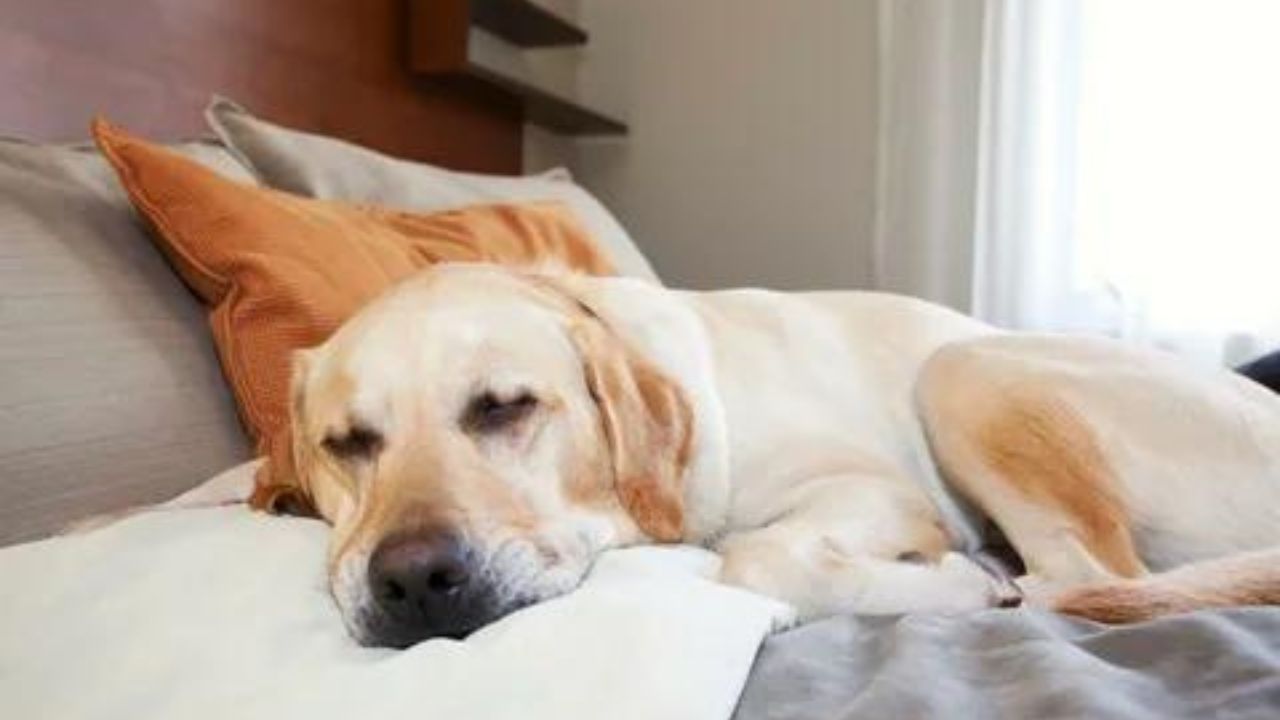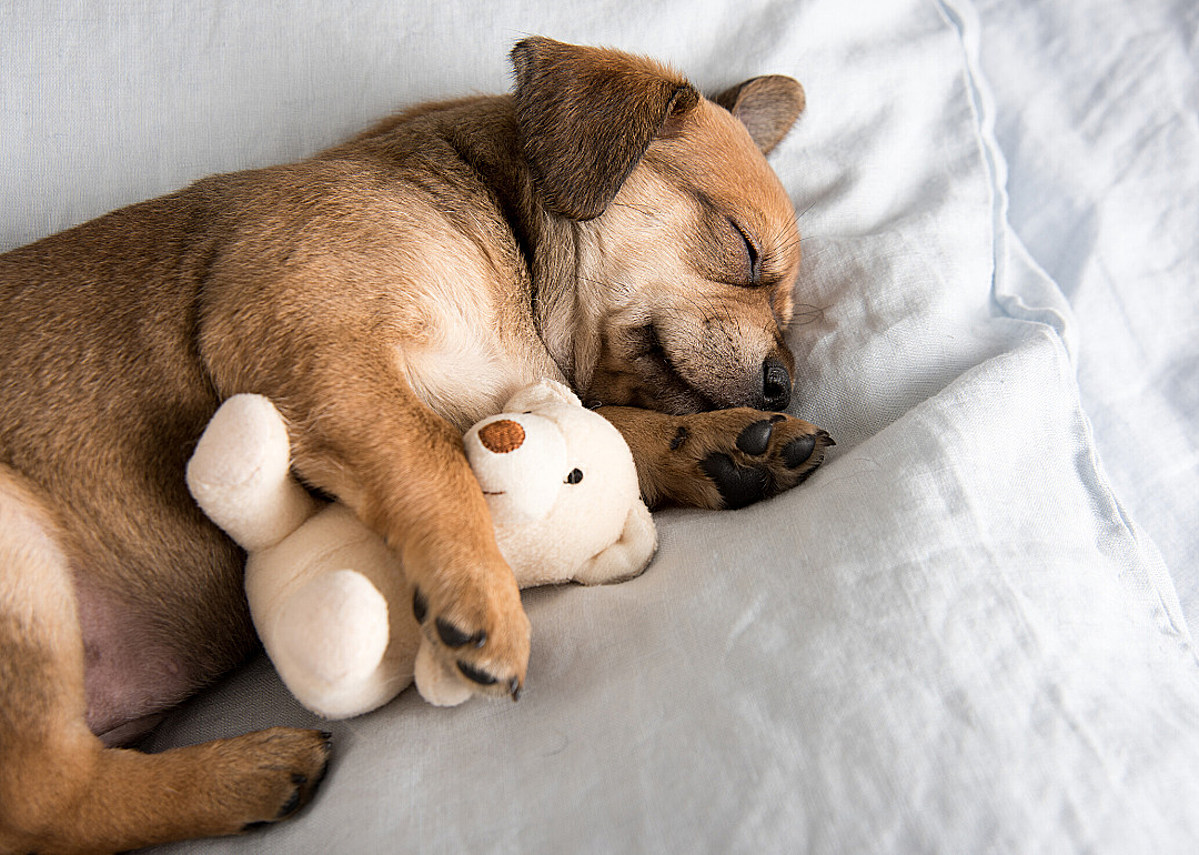
Looking at a bunch of sleeping puppies, it’s hard not to feel a warm fuzzy feeling inside. They’re all snuggled up, nestled against each other, and looking as cute as ever. But why do puppies sleep touching each other? Is there a reason behind this behaviour, or is it just a coincidence?
In this article, we’ll dive into the science behind why puppies prefer to sleep close together, as well as the social, emotional, and environmental factors that can impact their sleep habits. We’ll also provide tips for ensuring your puppy gets the rest they need to stay healthy and happy.
But first, let’s take a moment to appreciate the adorable sight of puppies sleeping together. After all, who doesn’t love a good puppy pile? And puppies enjoy sleeping near each other for some very good reasons. So grab a cup of coffee, and get ready to learn about the fascinating world of puppies’ sleep!
The Science Behind Puppies Sleep and Touching Each Other
As it turns out, there’s a lot of science behind why puppies sleep touching each other. From a biological and behavioural standpoint, sleeping in a pile is a survival instinct passed down through generations of dogs.
For one thing, puppies are born with an instinct to stay close to their littermates for warmth and protection. They’re born with a limited ability to regulate their body temperature, so cuddling up with their siblings helps them stay warm and cosy. Studies have shown that puppies who sleep alone have a higher risk of developing hypothermia or other health problems.
But it’s not just about warmth – sleeping close together can help puppies feel more secure and reduce stress. When puppies sleep in a pile, they release oxytocin, which promotes bonding and relaxation. This hormone helps puppies feel safe and secure, leading to better quality sleep and overall health.
Sleeping in a pile can help puppies develop important social skills and build strong bonds with their littermates. When puppies sleep together, they engage in a behaviour called “puppy pile-up,” where they squirm and wriggle around to find the most comfortable position. This activity helps puppies learn how to communicate and negotiate with each other, which can help them develop better social skills as they grow up.
Interestingly, this behaviour isn’t just limited to puppies – adult dogs also enjoy sleeping in piles, especially in colder weather. Wild dogs like wolves and coyotes have been observed sleeping together for warmth and protection.
The Importance of Socialization in Puppies
Puppies are known for being social creatures that love to play, interact, and explore their surroundings. As they grow and develop, socialization becomes increasingly important for their well-being and happiness. Socialization refers to exposing puppies to new people, animals, environments, and experiences in a positive and controlled manner, to help them develop social skills, confidence, and adaptability.
One of the key benefits of socialization in puppies is the development of healthy social behaviour. Exposing puppies to various people and animals early teaches them how to interact appropriately with others, read social cues, and communicate effectively. This can help prevent behavioural problems like aggression, anxiety, and fearfulness, which can be challenging to address later in life.
Socialization also plays a vital role in forming strong bonds between puppies and their owners. By introducing puppies to new experiences and people, owners can build trust and positive associations with their furry friends, making training easier and improving the overall quality of their relationship. Additionally, socialization can help puppies develop confidence and independence, which can be important for their mental and emotional well-being.
But socialization isn’t just about having fun and making friends. It can also have practical benefits for puppies, such as improving their ability to cope with new and stressful situations. For example, a well-socialized puppy is more likely to be comfortable in unfamiliar environments like the vet’s office, making routine check-ups and medical care less stressful for the puppy and its owner.
Socialization is critical to raising a happy, healthy, and well-adjusted puppy. By providing positive and enriching experiences from an early age, owners can help their furry friends develop the social skills and confidence they need to thrive in the world.
The Role of Warmth and Comfort in Puppies’ Sleep
Have you ever noticed how your puppy always seems to gravitate towards warmth and cosiness when it’s time to sleep? That’s because puppies, like humans, are creatures of comfort. They crave warmth, softness, and security, which can contribute to a better night’s sleep.
One of the key reasons why puppies sleep touching each other is to regulate their body temperature. Puppies are born without the ability to regulate their body temperature, so they rely on their mother and littermates to stay warm. By snuggling up close to each other, puppies can share body heat and maintain a comfortable temperature, even when the environment around them is cold.
But warmth isn’t just important for physical comfort and can significantly impact a puppy’s emotional well-being. Puppies are social animals who crave the comfort and security of being close to their littermates. Physical touches, like snuggling or nuzzling, can release feel-good hormones like oxytocin, which can help reduce stress and promote relaxation.
This is why providing your puppy with a comfortable and secure sleeping environment is important. A cosy bed with soft blankets and a warm, draft-free space can help your puppy feel safe and secure, improving their sleep quality. It’s also important to consider the temperature and lighting in the room where your puppy sleeps – a cool, dark environment can promote restful sleep and help your puppy feel more relaxed.
Of course, every puppy is unique, and what works for one may not work for another. Some puppies prefer to sleep alone, while others enjoy snuggling up close to their humans or furry siblings.
The Impact of the Environment on Puppies’ Sleep
Puppies, like humans, need a comfortable and secure environment to sleep well. Noise, temperature, and lighting can significantly impact their sleep patterns. Let’s take a closer look at how these factors can affect your furry friend’s snoozing habits.
Noise is one of the most common environmental factors disturbing a puppy’s sleep. Loud noises from traffic, construction, or even a nearby party can disrupt their sleep cycle and make it difficult for them to fall or stay asleep. Even if your puppy manages to drift off, sudden or loud noises can wake them up, causing them to feel anxious or disoriented. To minimize noise disruptions, consider using earplugs or white noise machines to create a quiet and peaceful sleeping environment for your puppy.
Temperature is another important factor that can impact your puppies’ sleep. Puppies regulate their body temperature differently than humans, and they can quickly become overheated or chilled if the room temperature is not appropriate. During the warmer months, ensure your puppy has access to a cool, well-ventilated space where they can stay comfortable.
Finally, lighting can also affect your puppy’s sleep. Puppies are highly sensitive to light, and bright or flickering lights can interfere with their natural sleep-wake cycle. Consider using blackout curtains or shades to block out any external light sources. Avoid using screens or electronic devices in the bedroom, as the blue light emitted by these devices can also disrupt your puppy’s sleep.
A comfortable and secure environment is crucial for your puppy’s sleep quality. By minimizing noise disruptions, regulating the temperature, and controlling lighting, you can create a peaceful and relaxing space where your furry friend can get the rest they need to stay healthy and happy.
How to Ensure Your Puppies Sleep Well
When it comes to ensuring your puppy gets a good night’s sleep, you can do a few things to help create a comfortable and secure sleeping environment. Here are some tips to consider:
Provide a Cosy Bed
A comfortable bed is key to helping your puppy get a good night’s rest. Ensure their bed is soft, supportive, and appropriately sized for their breed and age. Consider using a crate or an enclosed bed to create a den-like space that feels safe and secure to your puppy.
Minimize Distractions
Puppies can be easily distracted by noise, light, or environmental activity. To help your puppy sleep better, try to create a calm and quiet environment for them to rest in. Close curtains or blinds to block out light and minimize noise. Consider using a white noise machine or a calming pheromone diffuser to help your puppy relax.
Stick to a Routine
Just like humans, puppies thrive on routine. Establish a regular bedtime and wake-up time for your puppy, and try to stick to it as much as possible. This can help regulate their circadian rhythms and make it easier for them to fall asleep and wake up simultaneously each day.
Encourage Exercise
Regular exercise can help your puppy burn off excess energy and promote better sleep. Make sure your puppy gets plenty of opportunities to play and explore during the day, and consider taking them for a walk or run in the hours leading up to bedtime.
Monitor their Diet
What your puppy eats can also impact their sleep habits. Avoid feeding your puppy too close to bedtime, as a full belly can make it difficult to settle down and relax. Additionally, be mindful of the type and amount of food you’re feeding your puppy, as some ingredients can cause digestive issues or restlessness.
Following these tips can help your puppy get the rest they need to grow, develop, and thrive. Sleep is just as important for your puppy’s health and well-being as diet and exercise, so it’s worth creating a comfortable and secure sleeping environment.
Conclusion
There are many reasons why puppies prefer to sleep touching each other, and it’s not just because they’re cute and cuddly. Science shows that sleeping close together helps puppies regulate their body temperature, feel safe and secure, and develop social bonds with their littermates.
Socialization is a critical component of a puppy’s development, and sleeping close together is just one way that puppies learn to interact with others. When puppies sleep in a group, they learn important social cues and communication skills to serve them well.
Furthermore, creating a comfortable and secure sleeping environment for your puppy is essential for their health and well-being. Just like humans, puppies need adequate rest to grow and develop properly. By providing a cosy bed, minimizing distractions, and establishing a bedtime routine, you can help ensure your puppy gets the sleep needed to thrive.
So next time you see a group of puppies snuggled up together, remember that they’re adorable and learning and growing in important ways. And if you’re lucky enough to have a puppy of your own, take the time to create a safe and comfortable sleeping space for them, and watch as they sleep away, happy and content in the knowledge that they’re surrounded by love and warmth.








